On Gold Mountain Read online
Page 18
Even from his home on a distant continent, Fong See functioned as the headman of the village. He owned one hundred mou, approximately twelve American acres. He had a direct effect on almost all of the villagers’ lives. Thanks to Fong See, children’s stomachs would no longer bloat, and old women would no longer die from want of a bowl of rice. A few fortunate sons worked for Fong See back in Los Angeles, while the less adept members of his clan toiled in Dimtao’s ricefields, wading through the paddies, planting seedlings, pulling weeds, guaranteeing a good harvest. Others worked the vegetable patches. The shoulders and backs of these farmers and their wives were bent from years of carrying buckets hung from a pole slung across their shoulders coolie-style to bring water to the rows upon rows of fresh green sprouts. At night these families returned to houses owned by Fong See. His wealth and power were greater than any they had ever seen. The villagers relied on him for their survival. Now they gathered around Fong See, knowing he would have brought gifts for them all.
He handed out lai see to the village children. To family members he brought special gifts. Leong-shee, Uncle’s wife, exclaimed over a gold coin and a lacquer box concealing a bottle of perfume. Kuen, her five-year-old son, received a little boat with a propeller. He had never before seen a toy like this, and Eddy, with his usual enthusiasm, showed his cousin how to wind the rubber band and set the boat on a wobbly course through a shallow water puddle.
With gifts in hand, everyone followed closely as this well-dressed parade made its way down a narrow alley toward where Shueying was waiting in the house she had prepared for them. The dull gray brick had been whitewashed. Earthenware pots planted with miniature tangerine trees and blooming flowers had been festooned with red ribbons and set about her small courtyard. According to her son’s instructions, impromptu mattresses had been made from hay stuffed into loose cloth bundles and laid across the rough wooden planks that ordinarily made up the beds. Lacquered wood pillows had been bought in nearby Fatsan. Each bed had been hung with mosquito netting. “Honey buckets” had been placed under the beds on the assumption that the children would be too western to run out along the raised paths between the rice paddies and do their business.
Under Shueying’s watchful eyes, the servants had thoroughly cleaned the inside water system that ran from the roof to the outdoor kitchen area. One servant had gone for fresh water, carrying each bucket up to the rooftop storage tank, while another had cleaned each of the bamboo pipes that led back down to the kitchen. New gravel had been purchased and stuffed into each cleaned pipe. The water would filter through several levels of bamboo and gravel, and by the time it reached the kitchen holding pot, it would be clean. But even with these efforts, these foreigners—her son included—would not have the stomach strength to take the water straight. Everything would have to be boiled.
When they arrived at the house, there were no hugs, no kisses. Shueying’s grandchildren saw her as she was—a frail Chinese woman nearing her nineties. She was not precious to them; they seemed strangers to her. Sissee and Eddy watched—not with pangs of jealousy, for they had never known what it was like to have a grandparent, but with a kind of detached interest—as she took her gifts of tinned cakes and cookies, stashed them on a high shelf in her room, and assured her grandson Kuen that, if he were a good boy, she would give him a treat.
Later that first afternoon, Fong See—sitting at a low table set with a pot of tea and porcelain dishes of sweetmeats—received villagers who had complaints. A cousin had hoarded rice; a second cousin argued that his family had not been paid the proper bride-price for his only daughter; someone else requested a better house. Another cousin, Fong Suey Ming, pointed out that most villagers had no capital to start their own farms, and that sending relief funds—as Fong See had done so generously during famine years—could not solve the basic problem. Suey Ming suggested that his honorable Gold Mountain cousin make a large donation to help the villagers start a real farming business. To everyone’s surprise, Fong See promised to provide ten thousand American dollars.
That evening, Fong See hosted a banquet for the entire village. Each dish was filled with special ingredients that promised to bring long life, prosperity, and many sons. Fong See walked out among the tables, handing out more lai see to the children, the single girls of marriageable age, and a few relatives deserving of special attention and recognition. As Fong See passed from table to table, one of the old-timers spoke up. “Is our Gold Mountain See not like the woodcutter of legend?” A few mumbled their agreement and settled in for a postprandial story.
“The parents of the woodcutter were poor, and came from as poor a village as our Dimtao,” the old-timer began. “The woodcutter learned to love the forest, and each morning as he worked there, he wondered if he could do something for his parents. One day he heard the rushing of a waterfall. As he drank from it, he discovered that it ran with sweet wine. He filled his gourd and took it back to his father. Just as in our village, news traveled quickly. The next day when the woodcutter went to the forest, he found his neighbors at the waterfall. Oh, how angry they were, for they found only water in the glistening depths. The neighbors were so jealous that they threw the woodcutter into the waterfall, leaving him there to drown. In despair, he filled his gourd with the water and went home to his father. Again the gourd was filled with wine. You see, many can go to the source, but only our Gold Mountain See can get the wine.”
As the reunion ended, the evening turned dark and evil. Word passed that a spy in the village had informed local kidnappers of the whereabouts of the children. Fong See knew that he could not allow his family to stay in the village for any length of time. Even this one night posed many hazards. The children were quickly gathered up and locked into a stifling one-room house with no windows. Guards were hired and posted around the perimeter. Fong See questioned villagers to no avail.
After a restless and claustrophobic night, the family left Dimtao as quickly as they had arrived, but with far less fanfare. For the first and only time on this trip, they took the train. Kuen, Uncle’s son, traveled with them. Fong See thought Kuen could entertain Sissee and Eddy in the weeks to come.
For Kuen, the following weeks in Canton were both amazing and bewildering. No longer did Kuen have to attend school, bowing to his teacher each morning and afternoon. No longer did he have to memorize the four books of Confucius or the classics of the great poets. No longer did he have to study from the traditional Chinese primer, the Trimetrical Classic, or, as it was more widely known, Learning by Three Sounds. No longer did he play on the backs of the village water buffalo. No longer did Kuen join his brothers and other boys of Dimtao as they mounted an army and spent afternoons in the ricefields fighting the boys from neighboring villages.
Kuen had never been outside Dimtao except to make the annual New Year’s visit to the graves of his ancestors. As a result, Canton was far more frightening to him than to his foreign-born cousins. Kuen marveled at the wall twenty feet thick and close to forty feet high which protected Canton. He was astonished by a pagoda five stories high, the Temple of Five Hundred Gods, and the eight-hundred-year-old water clock. He was tantalized by the idea of the Island of Shameen with its lovely promenade shaded by banyan and camphor trees, but none of them was allowed to enjoy this, since only Caucasians were permitted on the island.
Kuen’s uncle, unable to find a hotel or inn in Canton suitable for his western family, had rented a mansion from a wealthy mandarin. It was a fine place, a regular Chinese compound with a large garden, a series of interior courtyards, a private temple for meditation, and many, many rooms. Kuen’s uncle said he wanted Ticie and the children to feel comfortable, and he made the house as European, as Caucasian, as he could. He commissioned a craftsman to make chamber pots topped with western-style toilet lids, which were then placed in a special room where they were lined up according to the size and age of each person. The bedrooms came with their own carved beds enclosed like small rooms by panels of carved teak and painted
glass.
All of this was as unfathomable to Kuen as the way his ghost relatives spent their time. During the day, Auntie Ticie and Sissee might stroll past immense godowns, the warehouses where exports such as tea, silk, and cassia were stored to be shipped out of the country, and imports such as cotton, wool, opium, and kerosene were stored upon their arrival. Fong See and the older boys went to the bazaars where quaint curios and native articles of every kind might be bargained for and obtained. Jade sellers hawked decorative ornaments in varying shades of stone, in varying quality, and in prices from a few cents to several thousand U.S. dollars. Other kiosks carried rare porcelains, bronzes, ivory, and teak. In the furniture stalls, Fong See bargained hard for carved pieces, some of them inlaid with mother-of-pearl. He sought out idols, knowing they always sold well in his stores.
Kuen’s uncle—so rich, so powerful—was secretive and clever. No one knew when he would go out or where he was going. Some days Fong See appeared in the downstairs entry dressed as little more than a peasant. Even though bad people wanted to get him, they couldn’t, for Kuen’s uncle was too elusive, too tricky to wear either his western clothes or the fancy robes of a mandarin out on the streets. Just as Fong See sought out oddities in his trips to fairs and expositions, he also sought out the strange and bizarre in China. He went to pawnshops and secondhand stores and bought them out lock, stock, and barrel. From antique dealers he bought huge lots, sometimes room upon room of merchandise. He risked buying pallets filled with this and that, not quite knowing if they would also include a piece of Han, T’ang, or Sung. It didn’t really matter, he explained, because he knew he could sell it all, marking everything up at least three times its cost to him.
Years later there would be those who wondered if, when Fong See opened his pallets back in Los Angeles, he would pull out a Sung Dynasty bowl and say to himself, “This is Sung. This is not worth only three times the amount I paid. This is worth twenty thousand dollars.” What is known is that some of the biggest collectors in the country went to Fong See, and that many of their collections ended up in museums. But Kuen comprehended little of this.
Everyone in the village said Kuen was lucky and he tried to feel lucky. He had heard tales of prosperous landlords and rich mandarins, so he had an idea of what to expect, but Fong See and his family didn’t live according to those expectations. They didn’t keep a cook in the house. They had no servants except for an old man who maintained the grounds. The mother was beautiful, kind, and gentle. When they had first come to Canton, she went with Fong See to buy. Lately, Kuen had overheard them arguing in the courtyard when she arrived ready to join Fong See on his excursions. Kuen didn’t understand their English words, but he noticed that now she elected to stay home, sit on what everyone called the veranda, and do her sewing.
The family treated Kuen well. He had a good time. He didn’t make trouble. He spoke only a little, letting the others do the talking. If Eddy or Sissee or one of the others said he was wrong, he agreed that he was. If they said that he didn’t play fair, he admitted it, even when he knew and they knew he was in the right. No matter what happened—even the time when his cousin Ming lifted him up by his pants and shook him like an old rag, and they both slipped on the wet stones and Kuen twisted his ankle—he did not complain.
Most of the time Kuen played with Eddy and Sissee. Eddy liked Canton. Bennie didn’t. Like Kuen, Bennie didn’t like to venture out of the compound, and acted nervous about what he was seeing, hearing, smelling. But Eddy liked hanging out with the people who would show him things. Those people turned out to be his interpreters, his rickshaw boys, the house coolies, and his sedan-chair bearers. After much pleading, his interpreter and a rickshaw boy might take him down to the Temple of Horrors, with its great crowds of fortune-tellers, jugglers, gamblers, peddlers, beggars, and children selling peanuts and matches, much as Eddy’s father had done fifty years before.
Encouraged by Eddy’s adventurism, his quick learning of colloquial Cantonese, and his irrepressible naughty streak, the interpreter and the kitchen coolie took him to Canton’s bawdy houses—not the high-class places where Ming and Ray might be, and not the places where a dreadful disease was nearly as certain a reward as a night’s pleasure, but places suitable for a fourteen-year-old foreign boy, where the girls were as young as he. For a few yuan, Eddy said, he could look, even touch. The girls—their faces powdered white, slashes of red painted across their lips—wore loose black coats and pants. Eddy had slipped his hand inside their jackets and run his fingers over their breasts. At least this was what he told Kuen.
Some afternoons, Ticie asked Kuen to teach Eddy and Sissee games that he liked, so he showed his rich cousins what they could do without money or store-bought toys. He taught them how to throw up a stone, then swipe up another stone off the ground, or throw up a stone and catch it on the back of his hand. Eddy would have nothing to do with this. “A girl’s game,” Eddy said in disgust. “Jacks.” Eddy preferred the stick game called gat. Any boy would like gat—so named because the game made a gat sound. Kuen found two bricks and laid a short stick across them. He then used a longer stick to flip the shorter stick into the air. Gat. Sometimes Eddy would catch the stick, sometimes not. If he did, Kuen would then lay his long stick down on the bricks. Eddy had one chance to throw his short stick to try to knock Kuen’s stick out of position. If he did—with a resounding gat—then he won the point. Sometimes they flew kites from the roof. Kuen taught Eddy how to attach shards of glass to his kite string and use it to try to cut the other person’s string. Pretty soon, Eddy was good enough to “pirate” Kuen’s kite all the time. The younger boy never complained.
In the afternoons, if Fong See had a visitor, tea was served accompanied by dishes of peanuts, watermelon seeds, salted plums, and preserved olives. As soon as Fong See had moved on, Eddy and Kuen snatched up the olive and plum pits and took them outside for their ongoing game of improvised marbles. Each took a turn tossing a piece of shattered roof tile to knock the olive pits out of a circle drawn in the dust. Sometimes they used the larger plum pits to knock out the smaller olives. Each boy’s collection of pits waxed and waned with an afternoon’s win or defeat.
Finally, Kuen’s uncle and his family once again packed their trunks and prepared for a northward journey. Kuen was sent back to the village. He tried to tell his family and friends about his adventures, about how strange it had been to see first-hand how these foreigners lived. “We don’t want to hear your bragging,” his friends said. “I don’t have time to listen to your nonsense,” his mother chided. Kuen learned to keep his memories to himself.
Travel in China was difficult at best. Officials and the common peasantry had long fought the introduction of railroads into the country. The opposition was the result of old customs and a well-founded distrust of foreigners. Poorly educated people—cart drivers, wheelbarrow pushers, and boatmen—believed that the railroads would irritate evil spirits who would then seek revenge upon the populace. (A railroad would also deprive these common workers of their livelihoods.) The educated class, on the other hand, had discovered that when a foreign entrepreneur—from England, Germany, France, Russia, or the United States—built a road, that road was then used by that particular nation’s government to extend its power in China, to gain some new piece of territory or trade advantage. Chinese officials realized that railroads—just like paved roads—would make travel easier for missionaries and other foreigners who wanted to exploit the country. The opposition had been so great that, back in 1875, the first railroad line from Shanghai to Wusung was bought by the Chinese authorities and destroyed. By 1919, however, there had been some progress, as fifty-four railroad lines tentatively webbed across China’s great expanse.
So, except for their hasty retreat from Dimtao, the Sees never traveled by rail. Instead they went by sedan chair, river steamer, hakka (a wooden boat for small canals), junk, sampan, horseback, or by the steamers that plied the China coast. Outside the major cities, the Sees pack
ed their own food and bedding, and brought along their own servants. Sometimes, after a long day’s travel by sedan chair, the family would settle into a country inn furnished only with simple beds and a stove built into the wall to serve cooking and heating needs.
Pleasant days drifted by on river steamers. The younger boys made up games. Ticie read or did needlework, encouraging Sissee to sit by her side and practice her stitches. Fong See often disembarked and walked along the shore as coolies pulled and hauled the ropes attached to the boat. Sometimes these laborers would know of a local family in dire straits, a family so poor that the landlord was about to shoo them off his land for late payment of rent or the bad quality of their crops. To these families Fong See made side trips. Did this esteemed farmer have anything he wanted to sell? Perhaps an ancestral altar for New Year’s worship? Perhaps some trinket from his honorable wife’s dowry?
Travel by sedan chair was far more arduous. Four coolies carried Letticie’s chair, two ran behind. When any two got tired, the new ones took over, never missing a step or upsetting the rhythm of their steady dog trot. The Sees had hired the best bearers, ones who promised always to stay out of step, which reduced the risk of motion sickness for the passenger. This type of transportation necessitated that Letticie and Sissee be separated. Sissee wore a white sailor hat to keep the sun off her fair skin. Letticie constantly looked back—shifting her weight, much to the coolies’ annoyance—to check whether her daughter was still in sight. At each rest stop, Ma said, “When I see your white hat coming, I know you are safe.”
During the next few months, Fong See fulfilled his third goal for this trip—business and the education of his sons. He and Ticie took separate approaches. Usually, Fong See focused on how to deal, while Ticie showed the boys what to look for. Just as artisans had taught Ticie how to appraise a piece of porcelain for its purity of design, she now taught her children. Ming and Ray—and, by osmosis, the younger children—learned to recognize the traditional shapes for Chinese porcelain—the ginger jar, rice bowl, and mei-ping vase.

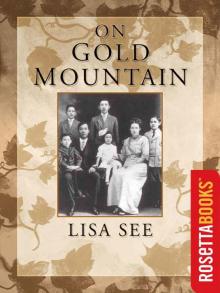 On Gold Mountain: The One-Hundred-Year Odyssey of My Chinese-American Family
On Gold Mountain: The One-Hundred-Year Odyssey of My Chinese-American Family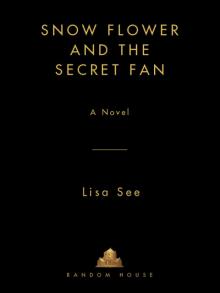 Snow Flower and the Secret Fan
Snow Flower and the Secret Fan Peony in Love
Peony in Love Flower Net
Flower Net Dragon Bones
Dragon Bones Shanghai Girls
Shanghai Girls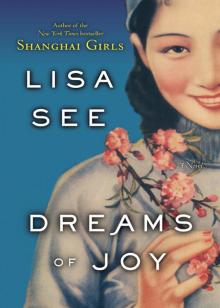 Dreams of Joy
Dreams of Joy The Island of Sea Women
The Island of Sea Women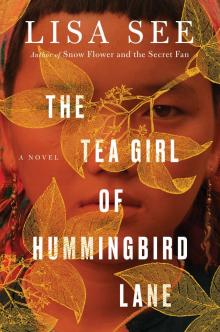 The Tea Girl of Hummingbird Lane
The Tea Girl of Hummingbird Lane China Dolls
China Dolls The Interior
The Interior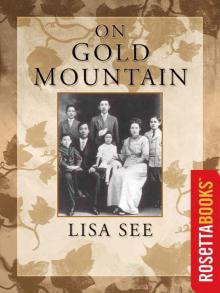 On Gold Mountain
On Gold Mountain